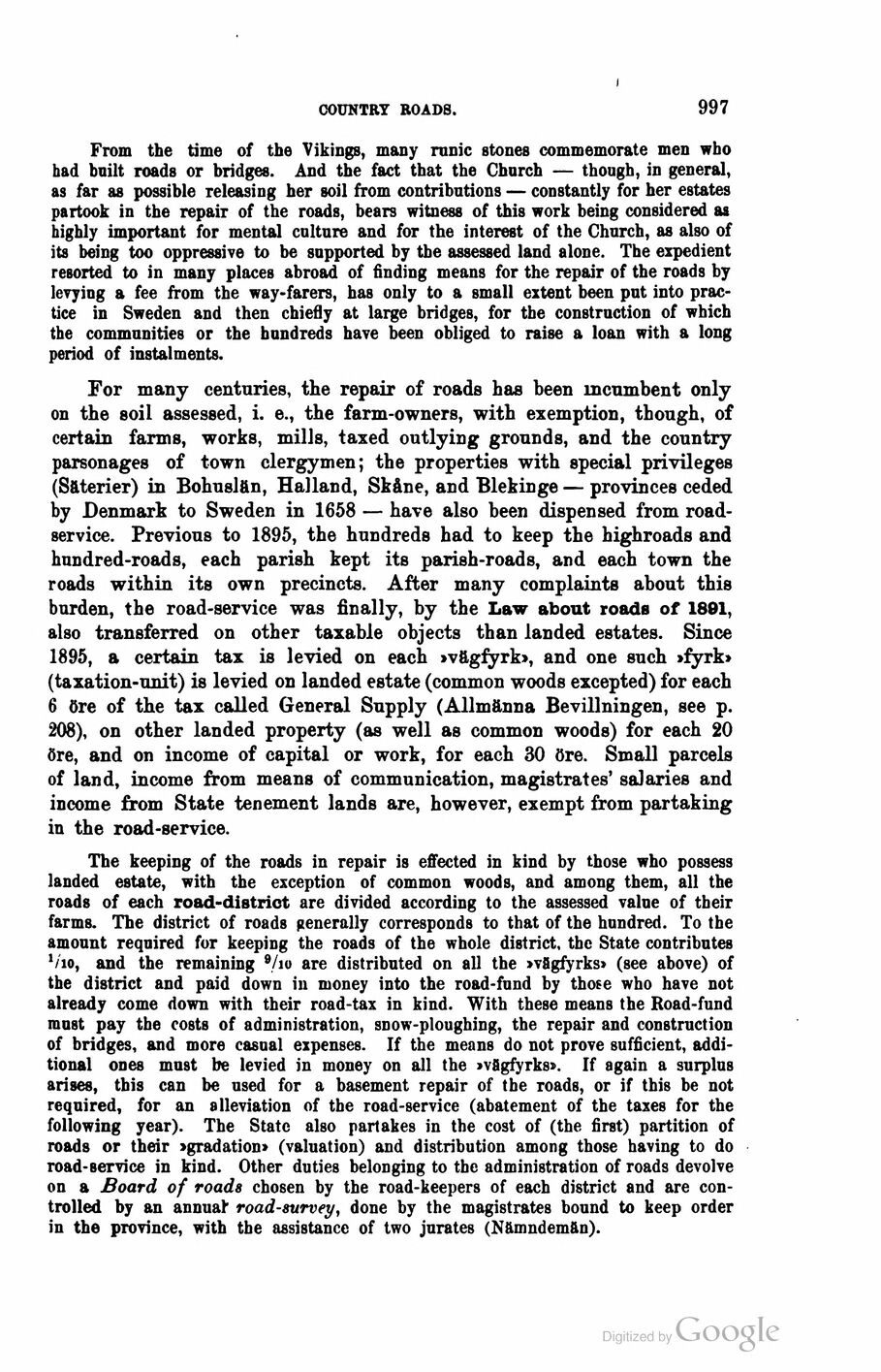
Full resolution (JPEG) - On this page / på denna sida - Second part - XIII. Internal Communications - 3. Country Roads. By J. P. Velander, Ph. C., Stockholm

<< prev. page << föreg. sida << >> nästa sida >> next page >>
Below is the raw OCR text
from the above scanned image.
Do you see an error? Proofread the page now!
Här nedan syns maskintolkade texten från faksimilbilden ovan.
Ser du något fel? Korrekturläs sidan nu!
This page has never been proofread. / Denna sida har aldrig korrekturlästs.
COUNTRY ROADS.
i
997
From the time of the Vikings, many rnnic stones commemorate men who
had bnilt roads or bridges. And the fact that the Chnrch — though, in general,
as far as possible releasing her soil from contributions — constantly for her estates
partook in the repair of the roads, bears witness of this work being considered as
highly important for mental culture and for the interest of the Church, as also of
its being too oppressive to be supported by tbe assessed land alone. The expedient
resorted to in many places abroad of finding means for the repair of the roads by
levying a fee from the way-farers, has only to a small extent been put into
practice in Sweden and then chiefly at large bridges, for the construction of which
the communities or the hundreds have been obliged to raise a loan with a long
period of instalments.
For many centuries, the repair of roads has been incumbent only
on the soil assessed, i. e., the farm-owners, with exemption, though, of
certain farms, works, mills, taxed outlying grounds, and the country
parsonages of town clergymen; the properties with special privileges
(Säterier) in Bohuslän, Halland, Skåne, and Blekinge — provinces ceded
by Denmark to Sweden in 1658 — have also been dispensed from
road-service. Previous to 1895, the hundreds had to keep the highroads and
hundred-roads, each parish kept its parish-roads, and each town the
roads within its own precincts. After many complaints about this
burden, the road-service was finally, by the Law about roads of 1891,
also transferred on other taxable objects than landed estates. Since
1895, a certain tax is levied on each »vägfyrk», and one such »fyrk»
(taxation-unit) is levied on landed estate (common woods excepted) for each
6 öre of the tax called General Supply (Allmänna Bevillningen, see p.
208), on other landed property (as well as common woods) for each 20
öre, and on income of capital or work, for each 30 öre. Small parcels
of land, income from means of communication, magistrates’ salaries and
income from State tenement lands are, however, exempt from partaking
in the road-service.
The keeping of the roads in repair is effected in kind by those who possess
landed estate, with the exception of common woods, and among them, all the
roads of each road-district are divided according to the assessed value of their
farms. The district of roads generally corresponds to that of the hundred. To the
amount required for keeping the roads of the whole district, the State contributes
Vio, and the remaining ®/io are distributed on all the »vfigfyrks» (see above) of
the district and paid down in money into the road-fund by those who have not
already come down with their road-tax in kind. With these means the Road-fund
must pay the costs of administration, snow-ploughing, the repair and construction
of bridges, and more casual expenses. If the means do not prove sufficient,
additional ones must be levied in money on all the »vfigfyrks». If again a surplus
arises, this can be used for a basement repair of the roads, or if this be not
required, for an alleviation of the road-service (abatement of the taxes for the
following year). The State also partakes in the cost of (the first) partition of
roads or their »gradation» (valuation) and distribution among those having to do
road-service in kind. Other duties belonging to the administration of roads devolve
on a Board of roads chosen by the road-keepers of each district and are
controlled by an annual1 road-survey, done by the magistrates bound to keep order
in the province, with the assistance of two jurates (Nämndemän).
<< prev. page << föreg. sida << >> nästa sida >> next page >>